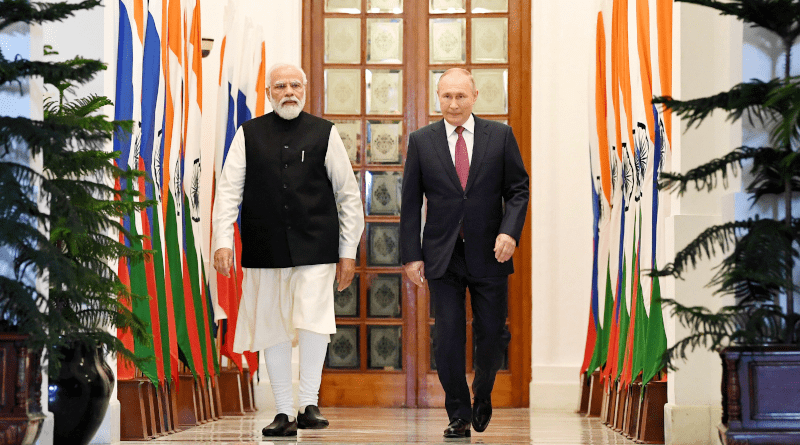India’s Need-Based Partnership: Why Russia Is Indispensable – Analysis
Given India’s stance as neutral and non-party to sanctions on Russia in the wake of Ukraine invasion, global critics raised eyebrows over India as protagonist for non-alignment movement and suspicion as strong supporter to the sovereignty of a nation. It demonstrated that India’s long standing original foreign policy was tampered in a great deal to keep pace with global political dynamism and inched towards need based partnership policy.
Eventually, India’s relation with Russia, which subsided after the collapse of Soviet Union, revived with a volta-face in the event of Ukraine war. This took western leaders taken back on Modiji’s “bromance” with authoritarian leaders, like Putin, President Donsld Trump and others like Prime Minister of Israel Benjamin Netanyahu. .
Historically, India’s strong relation with the Soviet Union developed to contain USA and China to nip the frequent razes by Pakistan and like minded western nations in the bud, despite two countries were besieged by opposite political systems.
In 1961, India’s overpowering of Portuguese from Goa, Damn and Deus by military power was acceded by Soviet Union , against severe criticisms by USA, UK, France and Turkey. These nations were up in the arms for withdrawal of troops.
In 1962, Soviet Union preferred to remain neutral in Sino-Indian war on border dispute.
In 1971, India signed with Soviet Union “ The Treaty of Peace, Friendship and Cooperation”. This worked more than face value of the agreement for strategic partnership when it resisted American warship “Seventh Fleet” in the Bay of Bengal, to support Pakistan in the wake of Bangladesh liberation .
The Soviet Union and later Russia’s unrelenting support to India’s stance on Kashmir issue attached a political significance to counter West. In 1955, Soviet Union declared an open support to Kashmir sovereignty, undermining Pakistan’s claim. The then Soviet leader Nikita Khrushchev said, “We are so near that if even you call us from mountain tops, we will appear on your side”.
Three times Soviet Union vetoed UN Council of Resolution ( 1957,1962 and 1971), that called for international intervention in Jammu & Kashmir issue, insisting that it was a bilateral issue between India and Pakistan.
Even though the collapse of Soviet Union loosen the relation between the two countries, the signing of Russian President Vladimir Putin and the then Indian Prime Minister Atal Behari Vajpai “Declaration of Strategic Partnership” in 2000, reinvigorated a new spirit for an uptick in the relation between the two countries. A decade later in 2010, this clung a further close partnership, when the declaration of strategic partnership turned into “Special and Strategic Partnership” , thereby affirming Russia’s pro-India stance.
Former Prime Minister Manmohan Singh greeted President Putin in his visit to India in 2012, “ President Putin is a valued friend of India and the original architect of India-Russia partnership”.
Vis-à-vis, India extended its support to Soviet Union, as and when they were needed. In 1956, India refrained from condemning Soviet Union suppression of Hungarian revolution and in 1968, it refrained from criticizing Soviet invasion of Czechoslovakia.
The crucial part of the legacy of India-Russia relation is India abstaining from voting against Russia in UN General Assembly as well as in UN Security Council for invasion in Ukraine.
Even though the deepened political and economic relations between India and Russia waned after the collapse of Soviet Union, the defence relation remains robust. Between 2016 to 2022, Russia accounted for approximately 45 percent of Indian military hardware imports, according to Stock Home International Peace Research Institute.
The buoyancy in trade between India and Russia after Ukraine invasion and sanctions revived economic relation between the two countries. Russia emerged the 5th largest trading partner of India in 2022-23. The bilateral trade between the two countries increased by 468 percent in 2022-23. From a mere 0.8 percent share in India’s global trade in 2021-22, trade with Russia spurred to 4.2 percent in 2022-2023. The trigger in the buoyancy in trade was mainly due to large imports of crude oil. It accounted for 74.1 percent of total import from Russia.
In 2022-23, oil imports from Russia spurred to 20 percent of total import of crude oil , as compared to 2 percent only in 2021-2022. A big advantage of the crude oil import from Russia was the discounted price offered to India These attributed to a big saving in foreign exchange of US $3.6 billion in 2022-23.
The crux of the revival of the trade relation with Russia is that even though India witnessed a big trade imbalance with Russia due to large import of oil, as compared to favourable trade balance with Soviet Union before the collapse in 1990, the surge in imports attached a great significance amidst the global uncertainty in oil prices. Repeated OPEC threat for cut in production and triggering oil prices increased the vulnerability of growth. India was importing nearly 70 percent of crude oil from OPEC before the sanction.
Oil is the second biggest energy in India. It accounts for nearly one-third of the total energy in the country. The crucial issue of energy basket is that while other energies, coal, hydro, nuclear are domestically available, more than 90 percent of oil energy is imported. Given this, Russian crude, with discounted prices, aids in sustaining India’s growth.


“A friend in need is a friend indeed” and that is what India and Russia are to each other.President Putin is a valued friend of India and the original architect of India-Russia partnership. Soviet Union vetoed UN Council of Resolution that called for international intervention in Jammu & Kashmir issue, insisting that it was a bilateral issue between India and Pakistan.The legacy of India-Russia relation is India abstaining from voting against Russia in UN General Assembly as well as in UN Security Council for invasion in Ukraine. “Special and Strategic Partnership” understanding each others needs irrespective of the leaders.